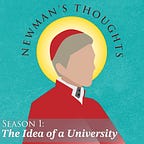Reading for Day 28: The Idea of a University, Discourse III, Bearing of Theology on Other Branches of Knowledge § 6
Complete Recording of Discourse III @ Catholic Culture Audiobooks
Paperback with Introduction by Dr. Don Briel available @ Cluny Media
Full online text of The Idea of a University and other works by St. John Henry Newman are available @ the National Institute for Newman Studies’ Newman Reader
Now, Gentlemen, pray understand how it is to be here applied. I am not supposing that the principles of Theology and Psychology are the same, or arguing from the works of man to the works of God, which Paley has done, which Hume has protested against. I am not busying myself to prove the existence and attributes of God, by means of the Argument from design. I am not proving anything at all about the Supreme Being. On the contrary, I am assuming His existence, and I do but say this:—that, man existing, no University Professor, who had suppressed in physical lectures the idea of volition, who did not take volition for granted, could escape a one-sided, a radically false view of the things which he discussed; not indeed that his own definitions, principles, and laws would be wrong, or his abstract statements, but his considering his own study to be the key of everything that takes place on the face of the earth, and his passing over anthropology, this would be his error. I say, it would not be his science which was untrue, but his so-called knowledge which was unreal. He would be deciding on facts by means of theories. The various busy world, spread out before our eyes, is physical, but it is more than physical; and, in making its actual system identical with his scientific analysis, formed on a particular aspect, such a Professor as I have imagined was betraying a want of philosophical depth, and an ignorance of what an University Teaching ought to be. He was no longer a teacher of liberal knowledge, but a narrow-minded bigot. While his doctrines professed to be conclusions formed upon an hypothesis or partial truth, they were undeniable; not so if they professed to give results in facts which he could grasp and take possession of. Granting, indeed, that a man's arm is moved by a simple physical cause, then of course we may dispute about the various external influences which, when it changes its position, sway it to and fro, like a scarecrow in a garden; but to assert that the motive cause is physical, this is an assumption in a case, when our question is about a matter of fact, not about the logical consequences of an assumed premiss. And, in like manner, if a people prays, and the wind changes, the rain ceases, the sun shines, and the harvest is safely housed, when no one expected it, our Professor may, if he will, consult the barometer, discourse about the atmosphere, and throw what has happened into an equation, ingenious, even though it be not true; but, should he proceed to rest the phenomenon, in matter of fact, simply upon a physical cause, to the exclusion of a divine, and to say that the given case actually belongs to his science because other like cases do, I must tell him, Ne sutor ultra crepidam: he is making his particular craft usurp and occupy the universe. This then is the drift of my illustration. If the creature is ever setting in motion an endless series of physical causes and effects, much more is the Creator; and as our excluding volition from our range of ideas is a denial of the soul, so our ignoring Divine Agency is a virtual denial of God. Moreover, supposing man can will and act of himself in spite of physics, to shut up this great truth, though one, is to put our whole encyclopædia of knowledge out of joint; and supposing God can will and act of Himself in this world which He has made, and we deny or slur it over, then we are throwing the circle of universal science into a like, or a far worse confusion.
Worse incomparably, for the idea of God, if there be a God, is infinitely higher than the idea of man, if there be man. If to blot out man's agency is to deface the book of knowledge, on the supposition of that agency existing, what must it be, supposing it exists, to blot out the agency of God? I have hitherto been engaged in showing that all the sciences come to us as one, that they all relate to one and the same integral subject-matter, that each separately is more or less an abstraction, wholly true as an hypothesis, but not wholly trustworthy in the concrete, conversant with relations more than with facts, with principles more than with agents, needing the support and guarantee of its sister sciences, and giving in turn while it takes:—from which it follows that none can safely be omitted, if we would obtain the exactest knowledge possible of things as they are, and that the omission is more or less important, in proportion to the field which each covers, and the depth to which it penetrates, and the order to which it belongs; for its loss is a positive privation of an influence which exerts itself in the correction and completion of the rest. This is a general statement; but now as to Theology in particular, what, in matter of fact, are its pretensions, what its importance, what its influence upon other branches of knowledge, supposing there be a God, which it would not become me to set about proving? Has it vast dimensions, or does it lie in a nutshell? Will its omission be imperceptible, or will it destroy the equilibrium of the whole system of Knowledge? This is the inquiry to which I proceed.




